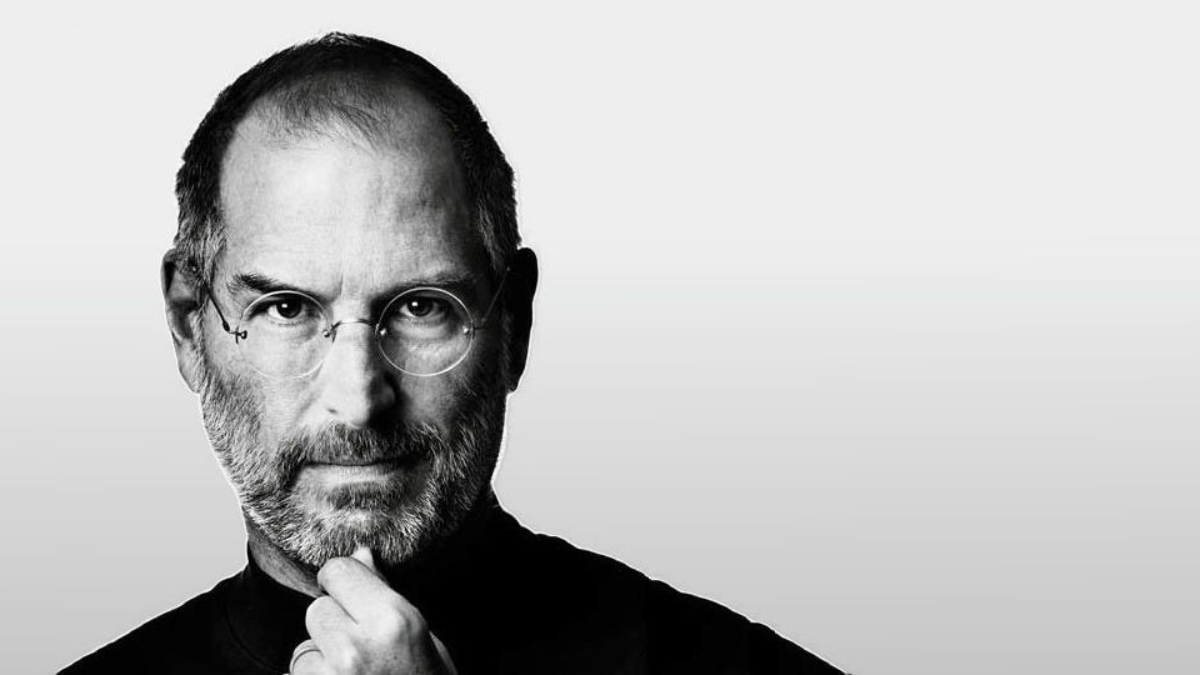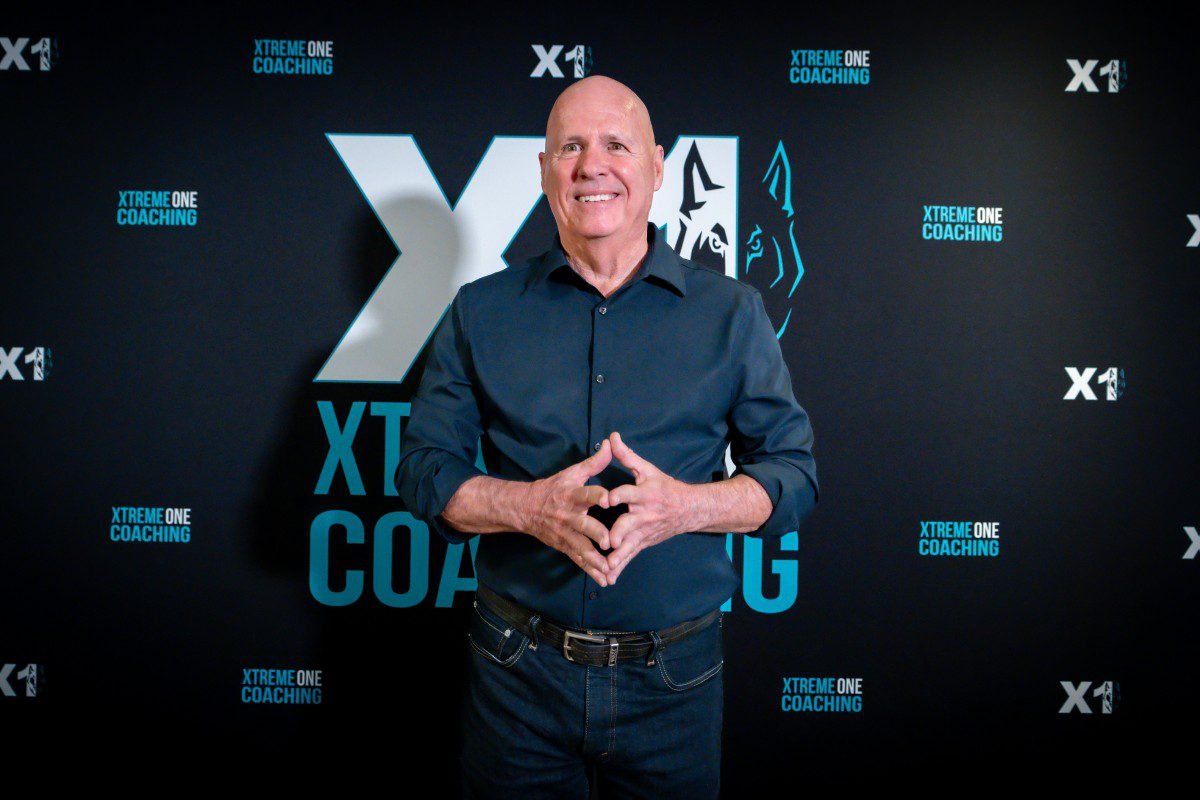Entrepreneurs
5 Lessons from Steve Jobs to Elevate Your Entrepreneurial Career
Published
1 year agoon

Embarking on the entrepreneurial journey, it’s impossible not to draw inspiration from the legendary Steve Jobs. Co-founder of Apple and a pioneer in revolutionizing the tech industry, Jobs’ enduring legacy holds invaluable lessons for today’s business leaders. In this comprehensive exploration, we will delve into the essence of entrepreneurship lessons, innovation mindset, success principles, passion-driven entrepreneurship, and team building strategies. These insights, woven into the fabric of business and entrepreneurship, offer a roadmap for aspiring entrepreneurs to navigate the intricate yet rewarding path of building successful ventures.
5 Lessons From Steve Jobs For Every Entrepreneur
Lesson 1: Think Differently – Cultivate an Innovation Mindset
In the dynamic landscape of entrepreneurship, thinking differently and challenging the status quo are pivotal for success. Steve Jobs was a master of disruptive innovation, introducing unique solutions and ideas that reshaped entire industries. For entrepreneurs, embracing creativity and innovation, even if it means diverging from conventional norms, can lead to groundbreaking outcomes. This innovation mindset, essential for navigating the ever-evolving business landscape, fuels the transformation of ordinary ideas into extraordinary ventures.
Lesson 2: Embrace Your Passion – Fuel for Drive and Determination
Passion is the invisible force that propelled Steve Jobs’ relentless drive and determination. As an entrepreneur, it’s not merely about running a business; it’s about pursuing a deep-seated passion and letting it guide your decisions. Jobs’ unwavering commitment to his work not only resulted in revolutionary products but also served as an inspiration for those seeking to make a meaningful impact. Passion-driven entrepreneurship aligns personal fulfillment with professional success, creating a powerful synergy that propels ventures to new heights.
Also Read: Mastering Finances: Essential Tax Tips for Small Business Owners
Lesson 3: Have a Vision – The North Star of Entrepreneurial Success
Central to Steve Jobs’ success was his unwavering vision for the future of technology. Entrepreneurs must similarly possess a well-defined vision for their businesses. A compelling vision acts as a guiding light, shaping strategies and decisions that propel the business forward. By envisioning the future and tirelessly working towards its realization, entrepreneurs can navigate challenges with a sense of purpose, ensuring sustained growth and impact in an ever-changing market.
Lesson 4: Persevere Through Setbacks – Turning Failures into Opportunities
Setbacks and failures are inevitable in the entrepreneurial journey. Steve Jobs faced numerous challenges but never allowed them to be roadblocks. Instead, he viewed setbacks as opportunities to learn, grow, and ultimately achieve success. Entrepreneurs need resilience and the ability to bounce back from failures. Embracing setbacks as stepping stones to improvement and growth positions entrepreneurs to overcome obstacles and emerge stronger on the path to sustained success.
Also Read: Upgrade Yourself With These Free Skill Development Courses for Entrepreneurs
Lesson 5: Surround Yourself with a Strong Team – Collaborative Success
The significance of a supportive and dedicated team cannot be overstated. Steve Jobs strategically surrounded himself with exceptionally talented individuals who shared his vision and values. Entrepreneurs, too, must prioritize building a strong team. A collaborative and cohesive team enhances creativity, efficiency, and overall business performance. By fostering a culture of collaboration and shared goals, entrepreneurs can amplify their impact and achieve sustained success in a competitive business landscape.
Connecting the Dots – Holistic Entrepreneurship
In weaving together the fabric of entrepreneurship lessons, innovation mindset, success principles, passion-driven entrepreneurship, and team building strategies, a holistic approach to business emerges. Entrepreneurs who internalize and integrate these lessons into their ventures stand poised for success. The amalgamation of thinking differently, embracing passion, having a vision, persevering through setbacks, and building a strong team creates a robust framework that transcends individual lessons, fostering a comprehensive understanding of what it takes to thrive in the business world.
Conclusion
In conclusion, Steve Jobs’ entrepreneurial journey offers a rich tapestry of lessons for those navigating the complexities of business. By thinking differently, embracing passion, having a vision, persevering through setbacks, and building a strong team, entrepreneurs can unlock their full potential. These principles, grounded in innovation, determination, and collaboration, serve as a blueprint for success. As you embark on your entrepreneurial path, remember: the lessons from Steve Jobs are not just a historical anecdote but a living guide for those with the courage to dream and the determination to turn those dreams into reality.
Sahil Sachdeva is an International award-winning serial entrepreneur and founder of Level Up PR. With an unmatched reputation in the PR industry, Sahil builds elite personal brands by securing placements in top-tier press, podcasts, and TV to increase brand exposure, revenue growth, and talent retention. His charismatic and results-driven approach has made him a go-to expert for businesses looking to take their branding to the next level.

You may like
Entrepreneurs
The Rise of Polyworking: Why America’s New Entrepreneurs Don’t Want Just One Job Anymore
Published
3 hours agoon
April 11, 2025
In the America of 2025, careers are starting to look less like ladders and more like spider webs. The old model was simple — study hard, get a degree, land a 9-to-5 job, and stay loyal to one company or one profession. But step into today’s entrepreneurial circles, and you’ll hear a completely different language. People proudly introduce themselves as a writer-developer, or a designer-strategist, or a marketer-podcaster-investor-creator — all in one breath.
This is the new age of polyworking — a work culture where having multiple careers, income streams, or professional identities isn’t seen as a distraction. It’s seen as an advantage. And it’s catching fire across America like never before.
Why Polyworking Feels Like America’s Next Big Workforce Revolution
Polyworking is not freelancing 2.0 or side hustle culture on steroids. It’s a complete mindset shift about how smart Americans are designing their careers post-pandemic. A new generation of entrepreneurs — especially Millennials and Gen Z — are no longer comfortable betting their entire life and income on a single role, a single company, or a single industry.
Economic uncertainty, layoffs, inflation, AI disruption, and the rise of remote work have all pushed Americans to rethink stability. And the answer isn’t always chasing bigger paychecks from bigger companies. It’s creating your own ecosystem of small income streams that together give you more freedom, flexibility, and control than any traditional job ever could.
The Typical Polyworker In America Today Doesn’t Look How You’d Expect
Forget the image of a 9-to-5 employee quietly running an Etsy shop on weekends. Polyworking in 2025 looks different. It’s people like:
→ A UX designer who runs a YouTube channel teaching design basics.
→ A marketing consultant who also ghostwrites LinkedIn content for CEOs.
→ A fitness coach who manages paid communities online while running local bootcamps.
→ A copywriter selling digital products on Gumroad, while building a newsletter audience on Substack.
→ A photographer who builds Notion templates and licenses stock videos on the side.
These aren’t hobbies anymore. They’re micro-businesses within a personal brand empire.

What’s Driving America’s Shift Toward Polyworking
The reasons behind this rise are real, practical, and deeply emotional. Americans are polyworking because:
→ Job security feels like an illusion after back-to-back economic downturns.
→ AI is eating repetitive jobs faster than companies can replace them.
→ Passive income from digital products is finally realistic at scale.
→ Platforms like Gumroad, Etsy, Substack, and Patreon made monetization frictionless.
→ Building a personal brand means opportunity now comes directly to individuals, not resumes.
→ And most importantly — people want to own their time.
In 2025, freedom is the new luxury.
Tools & Platforms Fueling The Polywork Boom
America’s polyworkers don’t just hustle harder — they build smarter. Their world runs on tools like:
→ Notion for project management across roles.
→ Calendly for managing client bookings.
→ Gumroad & Substack for monetizing knowledge.
→ Canva for content creation at scale.
→ AI tools like ChatGPT for faster output.
→ LinkedIn, TikTok, and Instagram for inbound client generation.
Technology didn’t just enable polyworking. It normalized it.
The Challenges Nobody Talks About
Of course, having multiple income streams comes with multiple problems. Time management becomes a survival skill. Switching between roles daily can feel chaotic. Financial planning is tricky when income is non-linear. Burnout is a real risk if boundaries aren’t clear.
But most polyworkers believe these are good problems to have. Because unlike the old system where one layoff could wipe you out overnight, polyworking gives resilience. If one income stream slows down, five others keep you afloat.
It’s diversified living.
How The American Employer Mindset is Changing Too
What’s even more interesting? Big companies in America are slowly catching up to this culture. Employers are hiring people not for one skill — but for their range.
A marketer who can also write copy. A designer who understands content strategy. A salesperson who can build community online.
The multi-skilled professional isn’t seen as unfocused anymore. They’re seen as future-proof.
In fact, America’s next great entrepreneurs might not be starting unicorn startups — they might just be running four small, profitable online projects that together pay better, feel better, and work better than any VC-funded rollercoaster ride.
Level Up Insight: In 2025, Playing Safe Looks Very Different
The riskiest thing you can do today is depend on one skill, one job, or one company.
The smartest entrepreneurs in America right now aren’t diversifying investments. They’re diversifying themselves.
If the last decade was about personal branding — this decade is about personal scaling.
Your skill stack is your safety net. Your content is your inbound lead machine. Your multiple roles aren’t confusing — they’re your career armor.
Polyworking isn’t just a trend. It’s the American dream — version upgraded.
Business
Meet the Mom Redefining Luxury Diaper Bags: Label The Muse Founder Saïka Bince Is Turning Motherhood Into a Fashion Statement
Published
5 hours agoon
April 11, 2025
When Saïka Bince caught a glimpse of herself in the mirror while packing a diaper bag one morning, she didn’t just see a tired mom—she saw a muse gone missing. That fleeting moment sparked a quiet revolution. What began as an identity crisis bloomed into a couture movement. Today, she is the founder of Label The Muse, a luxury fashion brand out of Atlanta that’s transforming motherhood into a main-character moment.
Label The Muse isn’t just about handbags—it’s about visibility. Power. Presence. It’s about telling mothers: “You can carry bottles and still carry the room.” With signature pieces like the Bince Bag, a handcrafted marvel that takes over 80 hours to create, this designer diaper bag brand blends form and function into a love language that speaks directly to women who refuse to choose between elegance and everyday reality.
A Muse Born of Many Names
For Saïka, a first-generation Haitian American and mother, fashion has always been about legacy. Each bag in the Label The Muse collection is named after a matriarch in her family: Kesner (her grandmother), Ti Nette (her mother), and Bince (herself). These names aren’t just titles—they’re tributes. Embroidered into the brand’s DNA is a generational celebration of womanhood, sacrifice, and strength. These handbags are heirlooms in the making, designed not only to carry the essentials of motherhood but also its emotional lineage.
From Beauty to Boldness: The Journey of a Self-Taught Designer
Before founding Label The Muse, Saïka spent nearly a decade immersed in the beauty industry, where she created a makeup brand rooted in self-expression and personal transformation. Motherhood didn’t merely change her path—it expanded it. Feeling the tension between function and fashion, Saïka began sketching and sourcing materials with a clear vision: to create a diaper bag that didn’t erase her identity but elevated it.
She taught herself how to sew from scratch. Every stitch, clasp, and curve of her designs became a deliberate offering to the modern muse navigating nap schedules and personal ambition in the same breath.
The Bince Bag: Where Function Meets Fashion
Luxury diaper bags. Designer diaper bags. Vegan leather handbags. Label The Muse delivers all three and more. Each piece is constructed from bold, standout vegan leather and finished with soft gold-painted stainless steel hardware. Inside? Thoughtfully engineered compartments for diapers, electronics, bottles (double-insulated, of course), and even waterproof linings. Outside? Bold textures, artistic silhouettes, and couture-caliber polish.
This is what sets Label The Muse apart: They don’t design for “motherhood.” They are designed for mothers.
Legacy in Every Loop
More than a business, Label The Muse is a living archive—a fashion house preserving the elegance of Black motherhood, amplifying its voice, and redefining its aesthetic. Saïka is building an empire where beauty and burden aren’t at odds, but co-exist in every bag she creates. For her, being a mother didn’t mean losing herself. It meant expanding. Becoming not less—but more. The woman. The nurturer. The creative. The leader. The muse.
“Identity isn’t either/or—it’s and,” she says. “When you embrace every part of who you are, you don’t shrink. You become legacy.”
The Future Is Fashioned by Mothers
While the fashion world has long treated motherhood as an afterthought in fashion, Saïka sees it as a centerpiece. Her vision? A runway where baby bumps wear silk. Campaigns where softness is seen as a strength. Fashion houses that finally honor the women doing the most sacred work: creating life while staying entirely themselves.
And Label The Muse is just the beginning.
You can explore the full collection and learn more about the story behind Label The Muse by visiting the official website at www.labelthemuse.com.
Entrepreneurs
The New Hustle Culture: Why America’s Gen-Z Is Choosing Freedom Over Fortune
Published
1 day agoon
April 10, 2025
In today’s America, success looks nothing like it used to. Gone are the days when having a corner office or a six-figure salary defined someone’s worth. For Gen-Z — the most fearless, digital-first generation in history — success isn’t measured by money alone.It’s measured by freedom.
Across the country, a quiet but powerful shift is happening. Gen-Z is rejecting the traditional 9-to-5 grind and corporate ladder dreams. Instead, they’re choosing side hustles, remote work, creator economy gigs, and small passion-led businesses. Not because they’re lazy. But because they value living on their own terms more than anything else.
Welcome to America’s new hustle culture — not about burnout, but about balance.
This generation grew up watching their parents sacrifice happiness for job security. They saw burnout glorified and corporate loyalty often go unrewarded. The pandemic only accelerated this mindset shift. For Gen-Z, control over time, mental peace, and creative freedom matter more than paychecks with golden handcuffs.That’s why across cities like Austin, Miami, New York, and even small towns — young Americans are building unconventional careers. They are launching Etsy stores, monetizing their TikTok following, selling digital products, offering freelance services, and building personal brands from their bedrooms.
And they’re thriving.

It’s no longer rare to see a 22-year-old running a profitable online store or a 19-year-old making thousands teaching a skill on social media. This isn’t just about quitting jobs. It’s about creating a life where work fits into their lifestyle — not the other way around. This new hustle culture is rooted in independence. But make no mistake — hustling today doesn’t mean working 24/7. Gen-Z isn’t romanticizing burnout. They’re building smarter, not harder.
They leverage tech, automation, remote teams, and passive income streams to work efficiently. And perhaps most importantly — they set boundaries. They prioritize rest as much as revenue. This is America’s fresh take on ambition. Another key reason for this shift is access.
Tools that were once expensive or difficult to learn are now widely available. Platforms like Shopify, Canva, TikTok, and Substack have lowered entry barriers. Anyone with a smartphone and an idea can start earning.
Gen-Z knows this better than anyone.
They’re not waiting for permission. They’re not waiting to climb the ladder. They’re building their own ladders.
Freedom-first entrepreneurship isn’t just a trend — it’s becoming America’s new economy. More and more young founders are choosing to stay small, profitable, and independent instead of chasing VC money or massive scale.Because for them, happiness isn’t about managing 200 employees. It’s about managing their own time.
Look around and you’ll see it everywhere.
- A content creator teaching Instagram growth.
- A designer selling Notion templates.
- A fitness coach building an online community.
- A writer monetizing a newsletter.
- A drop-shipper building niche e-commerce stores.
This isn’t just hustle. This is lifestyle design.
Of course, the journey isn’t perfect. Choosing freedom comes with challenges — unstable income, loneliness, managing multiple roles, and the pressure of always staying relevant online. But Gen-Z accepts these challenges in exchange for autonomy. They’re not obsessed with retirement dreams. They want a life they don’t need a vacation from — right now. This shift is forcing even traditional companies to evolve. Brands trying to hire Gen-Z talent know they need to offer remote flexibility, mental health support, side hustle acceptance, and growth opportunities beyond salary.
Because if not — Gen-Z will happily build their own thing.
America’s hustle culture has transformed from a burnout badge to a freedom badge. Young entrepreneurs are redefining wealth as experiences, flexibility, and peace of mind. It’s no longer about just chasing dollars.
It’s about chasing days filled with meaning.
Level Up Insight:
“America’s new hustle culture isn’t about working more. It’s about working smart, working free, and building a life that feels like yours. Gen-Z isn’t waiting for opportunity. They’re creating it — one side hustle, one personal brand, and one bold step at a time.”
Entrepreneurs
The American Franchise Gold Rush: Why Everyone Wants Passive Income Now
Published
2 days agoon
April 9, 2025
There’s a strange new obsession sweeping across America — and it’s not crypto, it’s not tech stocks, and it’s definitely not some viral online hustle. It’s franchises. The most old-school, almost boring business model in the book has suddenly become the hottest ticket in town. And everywhere you look — from TikTok gurus to Wall Street bankers — everyone’s quietly chasing one dream: passive income without starting from scratch.
In coffee shops across Dallas, in co-working spaces in Miami, at after-work dinners in New York — the conversation keeps circling back to the same question: “Bro, you looking into franchises yet?” Because something about America’s mood has changed. People aren’t just looking to build startups anymore. They want cash flow. Predictability. Ownership without chaos. And franchising — with its playbook-ready models, brand power, and operational structure — has become the new gold rush for an America exhausted by volatility.
Part of it comes from a simple realization. Starting your own business from zero sounds romantic, but it’s brutal. Ninety percent failure rates. Marketing headaches. Hiring nightmares. Meanwhile, franchises offer a strange kind of cheat code — a business in a box, often with systems already dialed in and customer demand already built. All you need is the upfront capital — and a little guts.
This is exactly why the franchise landscape in America has exploded over the last three years. From gym chains to food trucks, pet grooming studios to car washes, the smartest operators in the country aren’t launching apps — they’re locking down territories. They’re buying rights. They’re stacking locations.
But here’s the real twist: It’s no longer just old-school operators or retired corporate guys getting in on the action. It’s 28-year-old tech bros. It’s solo entrepreneurs. It’s content creators with cash but no time. It’s even Wall Street private equity firms who never cared about Chick-fil-A or fitness studios before — now buying entire franchise portfolios like they’re assets on a spreadsheet.
Because in an economy where inflation eats your savings, the stock market feels rigged, and real estate has gotten absurd — franchises offer something incredibly rare: cash flow you can touch.
The math is simple. Own three locations of a decent performing fitness franchise? You’re clearing $300K a year in operator profit — without having to invent anything new. Add a car wash? Scale a smoothie bar? License another brand? Suddenly, you’re looking at $1 million plus in profit annually — from businesses that have existed for decades.

That’s not startup founder life. That’s investor-operator life.
Social media has only accelerated this frenzy. Instagram is flooded with franchise success stories. TikTok’s algorithm pushes “passive income playbooks” like gospel. Even YouTube creators are making entire channels about “day in the life of a multi-unit franchise owner.” It’s aspirational content — but it’s also data-backed reality.
Look deeper, and you’ll see that franchising itself has leveled up. The old days of just fast-food giants dominating the scene are over. Today’s hottest franchises are often in niche categories: kids coding academies, IV hydration clinics, dog hotels, mobile car detailing, cryotherapy centers — businesses perfectly aligned with modern consumer behavior.
And unlike the startup world, where valuations are often imaginary and exits rare, franchise wealth is real. Locations get sold. Territories have value. Brands offer liquidity events. Private equity groups are circling like sharks, looking to buy multi-unit operators for aggressive multiples.
The result? Franchising has gone from boring to billionaire-worthy.
But make no mistake — this is not a passive “sit back and chill” game. America’s new-age franchise owners are treating their operations like real businesses. They’re hiring operators, building SOPs, optimizing marketing, creating content, and scaling with ruthless precision.
The goal isn’t just to own a few cash cows — it’s to build a portfolio. To turn a $200K investment into $2 million cash flow machine over a few years. To treat franchising like real estate on steroids — cash flow today, asset value tomorrow.
This is America’s new version of entrepreneurship. Less Silicon Valley. More Main Street. Less raise VC funding. More own the dirt.
It’s a cultural shift. In a world where everyone once wanted to be Mark Zuckerberg, more people now want to be the low-key millionaire next door who owns 10 car washes, drives a quiet Range Rover, and takes month-long vacations while the machines run.
The Gold Rush has changed. And America’s savviest entrepreneurs aren’t digging in the mines anymore.
They’re buying the land under the mines.
Level Up Insight:
Franchising in America isn’t just trending — it’s transforming. The next generation of wealth won’t just belong to tech founders or real estate moguls. It’s headed straight for the operators bold enough to own boring businesses that print real money. Because in 2025 America, freedom looks less like code — and more like cash flow.
Entrepreneurs
Rise of The American Solopreneur: Betting On Yourself
Published
3 days agoon
April 8, 2025
The New Face of Hustle: America’s Solopreneur Era
Walk through any café in New York, scroll past any Instagram reel from LA, or sit in on a business podcast in Austin — there’s a recurring character everywhere. It’s not a corporate CEO or startup founder backed by millions. It’s the solopreneur. Armed with a laptop, an audience, and relentless drive, the modern American solopreneur is changing the business narrative forever.
Gone are the days when success meant building a company with hundreds of employees. Today, success often means freedom, ownership, and impact — solo. And this shift isn’t just a phase; it’s becoming America’s loudest business anthem.
Why Solopreneurship is Winning in America
Post-pandemic America looks different. People experienced remote work, questioned corporate loyalty, and realized that platforms like Substack, Shopify, Patreon, and Gumroad aren’t just tools — they’re empowerment weapons.
The result? A flood of creators, consultants, coaches, and service providers saying goodbye to the 9-5 treadmill. They’re building personal brands over company brands. They’re launching offers without asking for permission. And they’re making six or seven figures completely solo.
The American dream? It just got a solopreneur upgrade.
Ownership Over Everything
Solopreneurship isn’t about being small — it’s about being sovereign.
This generation of builders doesn’t want to scale at the cost of sanity. They want ownership of their time, audience, and income streams. Whether it’s a fitness coach monetizing a newsletter or a designer running a one-person agency, the playbook stays the same — build an audience, own your platform, monetize directly.
What makes it powerful is control. No bosses. No investors. No boardrooms. Just the creator and their community.
The Rise of Audience-First Business Models
Earlier, people built products first and then searched for customers. Now? Solopreneurs build audiences first — then create exactly what their audience wants.
This audience-first model is unlocking possibilities America hasn’t seen before.
→ A chef creating viral recipe content, then selling online courses.
→ A fitness influencer monetizing personalized coaching.
→ A meme creator turning followers into newsletter subscribers.
→ A photographer selling digital presets globally.
In every field, solopreneurs are realizing — the bigger your owned audience, the bigger your leverage.
Tools Are The New Team
Another reason for this explosive rise? Technology.
Today, one person with the right tech stack can outwork an entire team from 2010.
Scheduling tools, payment gateways, automation systems, content creation platforms — everything is accessible and affordable. AI tools handle admin work, social media tools handle content, and monetization tools handle sales.
In the solopreneur world, your tech stack is your team.
Community Over Competition
Interestingly, American solopreneurs aren’t playing the corporate competition game. They’re collaborating.
Mastermind groups, digital communities, Slack channels, and Instagram collabs are how solopreneurs grow faster together. Knowledge sharing is currency. Partnerships over politics. It’s rewriting the old corporate playbook.
America’s solo economy is driven more by community than competition.
Level Up Insight:
“Solopreneurship is not about staying small. It’s about staying powerful. In the era of creator-driven businesses, America is witnessing a silent revolution — where owning your voice, audience, and revenue stream matters more than owning an office space. Level Up believes the future belongs to those bold enough to bet on themselves.”
The Future? Personal Brands as Empires
We’re entering a time where personal brands may outperform traditional startups. Solopreneurs aren’t chasing VC funding — they’re chasing freedom, alignment, and direct impact.
From TikTok creators in Texas to business coaches in Florida, from newsletter writers in Chicago to designers in San Francisco — America’s solopreneurs are building lean, profitable, global micro-empires.
They might not have big teams or board meetings.
But they have what every entrepreneur dreams of — ownership, independence, and freedom.
And that might just be the most American thing of all.

There was a time when chasing the American Dream meant moving to a big city, landing a corporate job, and slowly climbing the ladder in a glass-walled office. But that version of success feels ancient today. The America of 2025 tells a very different story. Now, ambition lives online.
Across the country, a new wave of entrepreneurs is quietly reshaping what it means to succeed. They aren’t building businesses the traditional way. They’re building remote empires — from bedrooms, coffee shops, co-working spaces, or sometimes from a beach halfway across the world.
The rise of remote entrepreneurship in America didn’t happen overnight. The pandemic may have forced millions to work from home, but it also opened their eyes. It showed people that freedom was possible — not just working remotely for someone else — but building something of their own.
In 2023 alone, the U.S. Census Bureau recorded over 5.5 million new business applications — the highest in American history. And what’s more interesting? The majority of these new businesses were digital-first, location-independent, and designed for scale without borders.
This is America’s new playing field. A world where skills matter more than degrees. Where content is currency. Where anyone with Wi-Fi and drive can compete globally.
Take a scroll through LinkedIn or Twitter (X), and the new-age American entrepreneur is everywhere. A 25-year-old in Texas runs a seven-figure e-commerce brand from his phone. A mom in Ohio makes six figures selling online courses while managing her kids. A 19-year-old in California earns more from digital templates on Etsy than most junior corporate jobs pay in a year.
These stories aren’t rare anymore — they’re becoming the new normal.
Remote entrepreneurship has democratized opportunity. No longer is success limited by geography or background. The tools available today allow anyone to build, create, and sell to a global audience.

Platforms like Shopify power online stores. Upwork and Fiverr connect business owners with talent worldwide. Zoom replaced boardroom meetings. Stripe processes payments instantly across countries. And social media? It’s the new marketing department — free, viral, and powerful.
In fact, the modern American entrepreneur often builds with a tiny team, but a massive reach.
But let’s not romanticize it too much — the remote path has its own set of brutal challenges.
Entrepreneurs working from home deal with isolation, burnout, and discipline struggles. Without clear boundaries, work can spill into every hour. Scaling remote teams requires trust, systems, and strong communication across time zones. Managing global clients comes with cultural nuances and expectations that can’t be ignored.
Yet, for those who master this new playbook, the rewards are extraordinary. Freedom over their schedule. Global income streams. And the ability to live life on their own terms.
More importantly, America’s remote entrepreneurs are building brands, not just businesses. They understand that in an online world — personal reputation is everything. They build audiences on Instagram, Twitter, LinkedIn, and TikTok — not just for attention, but for authority.
These aren’t just freelancers or solopreneurs. They are CEOs of their own lives — operating with the precision of a startup founder, but with the freedom of a creator.
Interestingly, this shift is forcing even big investors and traditional companies in America to rethink their strategies. Venture Capitalists are no longer just chasing the next tech hardware startup. They’re investing in creators, agencies, community-led brands, and remote-first companies that are scaling faster than old-school businesses.
The lines between content creator, entrepreneur, and CEO are blurring every day.
America, always the land of opportunity, is proving once again that its greatest export isn’t just technology — it’s ambition without limits.
We are entering an era where a teenager in Nebraska can build a global SaaS tool. Where a designer in Miami can run a seven-figure agency hiring talent from three continents. Where success is measured not by office size — but by lifestyle design.
Level Up Insight:
At Level Up, we don’t just report trends — we see the future. And the future belongs to those bold enough to build it without borders.
Remote entrepreneurship isn’t a pandemic trend — it’s America’s new operating system. It rewards creativity over credentials. Action over excuses. Skills over degrees.
In this new world, your greatest asset isn’t your location — it’s your ability to execute online.
Because the new American Dream isn’t about where you work.
It’s about how free you are while you work.
Entrepreneurs
From Side Hustle to $7M Brand: The Rise of Sleepy Sundays
Published
1 week agoon
April 4, 2025
“How a 26-year-old turned a cozy clothing idea into a cult empire”
When Ava Monroe posted three pastel loungewear sets on TikTok in 2022, she didn’t expect a revolution. But three years later, her brand, Sleepy Sundays, has turned into a $7 million sensation—featured in Vogue, stocked in Nordstrom, and worn by influencers across the U.S.
What began as a weekend hobby is now one of the most talked-about indie fashion brands in the loungewear space. But this isn’t just a feel-good tale of virality—it’s a blueprint for modern entrepreneurship.
The Spark: A TikTok, a Question, and 50 Preorders
It all started with a video captioned, “Why is cute loungewear either super expensive or super ugly?”
That single question, shared to a few hundred followers on a sleepy Sunday night, triggered an avalanche. By the next morning, Ava had 50 preorders. She didn’t even have a business name yet—just a sewing machine, three fabric rolls, and her mom helping her cut patterns in their dining room.
That question became a brand.
That brand became a movement.
From Bedroom Business to Viral Brand
Ava didn’t rush. She made each order by hand for the first three months, testing styles and fabrics. When customer feedback exploded—“This is softer than SKIMS,” one commented—she knew she was onto something.
In early 2023, Ava partnered with a local ethical manufacturer. She built a Shopify store, set up a mailing list, and launched a simple but effective drop model: new colors every Sunday at 10 a.m. PST. The result? Scarcity + ritual = obsession.
Shoppers set alarms. Sets sold out in minutes. “I got cart-jacked twice!” one fan posted.
Within a year, revenue skyrocketed by 400%, with almost no paid advertising. Just TikTok and word of mouth.

Brand Aesthetic That Sells Itself
From her color palette (muted pastels + earthy tones) to her minimalist packaging, Ava understood her audience deeply: Gen Z women who craved both comfort and cool.
Sleepy Sundays didn’t just sell clothes—they sold a feeling. A Sunday morning vibe. A lifestyle where softness wasn’t just physical, but emotional. Every product came with a handwritten note and a Spotify playlist link. Details mattered.
Smart Scaling: Growth Without Chaos
In mid-2024, Ava secured a $250,000 angel investment to hire a small team—two full-time designers, a content strategist, and a logistics manager. The brand stayed lean and profitable.
Instead of expanding to dozens of products, Ava stuck to three core items: the “Cloud Set” (her original bestseller), the “Drift Robe,” and the “Midnight Romper.” Each was released in small batches, allowing for feedback-driven iteration and nearly zero inventory waste.
By Q4 2024, she was generating $580,000/month in revenue, with a loyal following and 40% repeat purchase rate.
Social Strategy: Mastering TikTok’s Algorithm
TikTok wasn’t just Ava’s launchpad—it was her marketing backbone. 85% of her traffic still comes from short-form content. Her strategy?
-
No hard selling. Just storytelling, outfit inspiration, and behind-the-scenes content.
-
Customer features. Real people wearing the product in their homes.
-
Aesthetic consistency. Every post felt like part of the same cozy universe.
-
Authenticity. Ava appears often on camera, unfiltered, sharing struggles and wins.
A 15-second video showing her dog sleeping next to folded loungewear went viral with 3.2M views. The caption? “It’s called brand alignment.”
Lessons for Entrepreneurs
There’s more to this story than fabric and filters. Ava’s journey offers powerful lessons:
-
Start before you’re ready. Ava didn’t have a business plan—just a question and a sewing kit.
-
Lean works. For 18 months, she ran everything from her bedroom: design, fulfillment, customer service, content. Constraints became creative fuel.
-
Purpose > product. People didn’t just buy sets—they bought into Ava’s ethos of softness, self-care, and slow living.
-
Be human. Every mistake she made (delayed shipments, wrong sizes) was owned publicly and turned into relatable content. Transparency built trust.
Challenges Along the Way
Not everything was smooth.
Managing explosive growth while maintaining quality was hard. In late 2023, a batch of defective stitching led to 300 refund requests. Ava posted a TikTok addressing it: “We messed up. Here’s what we’re doing to fix it.” The video gained 1M likes—and strengthened customer loyalty.
Another challenge? Copycats. Fast-fashion giants began mimicking her designs. But Ava stayed focused. “You can copy the clothes, but not the connection,” she said.
Where Sleepy Sundays Goes Next
In 2025, Ava plans to open a pop-up experience store in Los Angeles—not to push product, but to build community. Picture a space with a reading nook, fresh tea, cozy corners to nap, and exclusive try-ons.
She’s also launching Sleepy Kids, a mini collection designed for children with sensory sensitivities. The idea came from DMs she received from parents of autistic kids who loved the fabric feel.
This isn’t a brand chasing trends. It’s one building a universe.
Level Up Insight:
In today’s digital economy, authenticity scales faster than ads. Entrepreneurs who build communities, not just companies, are rewriting the rules. Ava Monroe didn’t just sell loungewear—she sold a feeling, a moment, a message: you deserve softness.
Her story proves that sometimes, the most powerful businesses start from the most personal places. Like a question asked on a Sunday.
Entrepreneurs
U.S. Entrepreneurial Activity Surges to Historic Highs
Published
1 week agoon
April 3, 2025
Entrepreneurship in the United States is experiencing a powerful resurgence, with new business creation reaching historic highs. According to the latest research, 19% of adults are now actively engaged in starting or running a new business—matching record levels from two years ago. This renewed surge highlights the resilience, ambition, and creativity of the American entrepreneurial spirit.
However, beneath this impressive growth, deeper trends are shaping the entrepreneurial landscape. Many are launching businesses out of necessity rather than opportunity, digital transformation is reshaping operations, and certain demographics—including veterans, women, and minority groups—are making significant strides in the entrepreneurial space. These shifts underscore the need for policies and support systems that nurture business sustainability and long-term success.
Entrepreneurial Growth: A Double-Edged Sword?
While high levels of entrepreneurial activity signal innovation and economic dynamism, they also point to underlying challenges. More than two-thirds of entrepreneurs cite job scarcity as a primary motivation for starting a business. This trend has been increasing since 2022, suggesting that necessity, rather than pure opportunity, is driving many into self-employment.
At the same time, the number of mature business owners remains low. Only 6.6% of Americans operate established businesses—far below the average of other high-income nations. Business closures are also rising, primarily due to financial struggles and profitability issues. These statistics highlight the fragile nature of many startups, emphasizing the need for better access to capital, mentorship, and long-term stability strategies.
Women Entrepreneurs: Closing the Confidence Gap
Women’s participation in entrepreneurship is gaining momentum, with an increasing number of women recognizing their capabilities in the business world. In 2024, their confidence in starting businesses rose significantly compared to the previous year. However, a gender gap still exists—only 48% of women felt capable of starting a business compared to 63% of men.
A notable positive trend is the increase in women-led businesses expanding into international markets. In 2024, 27% of female entrepreneurs reported global market activity—a jump of nearly 25% from the previous year, bringing them to the same level as their male counterparts.
While these statistics showcase resilience and progress, the lingering perception gap suggests that fostering supportive ecosystems—through mentorship, funding access, and policy incentives—is crucial for ensuring that more women confidently step into entrepreneurship.
The Digital Revolution: Entrepreneurs Embrace AI and E-Commerce
Technology continues to redefine how businesses operate, with digital sales and artificial intelligence (AI) adoption surging among entrepreneurs.
- 68% of entrepreneurs and 47% of business owners report that at least a quarter of their sales come from digital channels.
- 63% of entrepreneurs and 49% of business owners already use AI, and even more expect it to become a critical part of their business strategies in the next three years.
- 91% of entrepreneurs rely on social media, and 81% use data analytics to drive decision-making.
These trends emphasize the increasing reliance on digital tools to enhance efficiency, optimize marketing strategies, and boost customer engagement. However, while digital transformation presents vast opportunities, it also raises concerns about data privacy, cybersecurity, and the need for widespread tech education. Addressing these challenges can further empower small businesses to remain competitive in the evolving digital landscape.

Optimism and Opportunity: The Power of Diversity in Entrepreneurship
The entrepreneurial mindset varies across different demographics, with Black and Hispanic entrepreneurs demonstrating higher levels of optimism, opportunity perception, and risk-taking than their White counterparts.
- 90% of Black individuals and 87% of Hispanic individuals view entrepreneurship as a good career choice, compared to 80% of White individuals.
- 65% of Black individuals believe it is easy to start a business, versus 59% of Hispanic individuals and 55% of White individuals.
- Both Black (71%) and Hispanic (71%) entrepreneurs are more likely than White entrepreneurs (63%) to prioritize making a societal impact.
These findings suggest that entrepreneurship is not just a financial pursuit but also a vehicle for social change and economic empowerment within underrepresented communities. By supporting minority entrepreneurs with targeted funding, mentorship, and policy initiatives, the business landscape can become more inclusive and equitable.
Sustainability Becomes a Business Priority
Sustainable entrepreneurship is no longer a niche concept—it is becoming a mainstream priority. A growing number of entrepreneurs and business owners are putting social and environmental impact above profitability.
- 60% of entrepreneurs and 47% of business owners prioritize sustainability as a core business strategy.
- 62% of entrepreneurs and 59% of business owners actively reduce their environmental impact.
- Younger entrepreneurs (ages 18–34) are leading this movement, incorporating sustainability into their business models more than older generations.
This shift reflects a broader consumer demand for ethical and environmentally responsible businesses. Companies that integrate sustainability into their operations not only contribute to global solutions but also attract customers, investors, and employees who value purpose-driven work.
Military Veterans: Natural Entrepreneurs with a Competitive Edge
Military veterans and active-duty personnel are making significant strides in entrepreneurship, leveraging their leadership skills, discipline, and resilience to build sustainable businesses.
- Veterans and active-duty military members have higher business ownership rates (16% and 11%, respectively) than non-military individuals (6.1%).
- Nearly half of active-duty service members are currently starting or running a business.
- Veterans are equally likely as civilians (19%) to engage in entrepreneurial activity.
The data suggests that entrepreneurship offers a promising career path for service members transitioning to civilian life. Their ability to navigate complex challenges, work under pressure, and lead teams makes them well-suited for business ownership. Expanding access to veteran-focused funding programs, mentorship initiatives, and networking opportunities can further strengthen their impact in the entrepreneurial world.
What’s Next for U.S. Entrepreneurs?
The rise in entrepreneurial activity signals a promising era of business innovation and economic growth. However, to ensure long-term success, addressing key challenges—such as financial accessibility, digital transformation, gender gaps, and sustainability—will be crucial.
The next phase of entrepreneurship will likely be shaped by:
- Increased support for underrepresented groups, ensuring inclusivity in business growth.
- Continued technological advancements, requiring entrepreneurs to stay adaptable and digitally literate.
- Stronger focus on sustainability, aligning business success with social and environmental responsibility.
With the right policies, resources, and mindset, entrepreneurs can turn today’s challenges into tomorrow’s opportunities—driving innovation, economic strength, and a more equitable business landscape for all.
Entrepreneurs
It’s Never Too Late: The Power of Reinvention at Any Age
Published
1 week agoon
April 2, 2025
In a world often preoccupied with youth and instant gratification, the narrative of personal and professional reinvention can be a powerful source of inspiration. The story of individuals who defy conventional expectations and achieve remarkable success later in life serves as a potent reminder that it is never too late to pursue one’s passions, build wealth, and make a significant impact. This article explores the journey of such an individual, a testament to resilience, determination, and the boundless potential for reinvention, proving that the pursuit of purpose and success is a lifelong endeavor.
A Life of Service and a Call to Change
The individual at the heart of this narrative has dedicated a lifetime to serving others, embodying a spirit of altruism and commitment. With a background spanning diverse fields, including spiritual leadership and international outreach, their career has been marked by a consistent focus on making a positive difference in the lives of others.
For over three decades, this individual’s work took them to countries in Latin America, where they played a pivotal role in leading religious organizations, establishing youth programs, and developing a consulting firm focused on language education. Upon returning to the United States, their commitment to service continued through pastoring a church and establishing feeding centers for underprivileged children in South America.
However, years of service revealed a troubling pattern: many individuals in leadership positions approached retirement with inadequate financial resources. This realization sparked a desire to address this issue, not only for the benefit of others but also for personal financial security.
Defying Age and Embracing New Challenges
At an age when many consider slowing down or retiring, this individual embarked on a new path, demonstrating that ambition and the capacity for growth are not limited by age. Leveraging a strong foundation in leadership, interpersonal skills, and strategic thinking, they entered the financial services industry, driven by a passion to help clients build a secure financial future.
This transition was characterized by a commitment to integrity, honesty, and continuous learning, principles that have guided their approach to this new career.

Overcoming Obstacles and Building Resilience
The journey has been far from easy. This individual’s life has been marked by significant challenges, including navigating political and social instability in Latin America and facing life-threatening situations. These experiences have shaped a resilient outlook on life and a deep appreciation for the importance of financial preparedness.
A key source of inspiration has been the example set by their father, who demonstrated unwavering determination in the face of adversity. This influence instilled a powerful belief in the value of persistence and the understanding that success is built through perseverance, not excuses.
This tenacity has been evident throughout their career, from mastering a new language through immersion to leading organizations with limited resources and embracing an entirely new industry later in life.
Proving the Doubters Wrong
One of the most significant hurdles in this journey has been overcoming skepticism from others. This individual faced the challenge of proving to those who doubted them that it is possible to start anew and achieve significant success, regardless of age.
Their entry into the financial field was driven by a clear purpose: to address the financial vulnerabilities of those around them and to provide solutions focused on long-term security. Their expertise lies in developing retirement strategies that prioritize financial well-being and mitigate unnecessary risks.
A Commitment to Impact and a Vision for the Future
Despite being relatively new to the financial services industry, this individual has achieved notable success and remains dedicated to mastering their craft. Their definition of success goes beyond mere financial gain, emphasizing the importance of providing clients with peace of mind.
Looking ahead, their vision includes not only continued success in the financial sector but also an expansion of philanthropic endeavors, with the goal of supporting numerous feeding centers in Latin America. Ultimately, they aspire to be recognized as a trusted financial expert, leaving a legacy of reinvention and resilience.
Their story serves as an inspiration to others, demonstrating that it is never too late to pursue new goals, achieve success, and make a meaningful contribution to the world.
Level Up Magazine’s Perspective
At Level Up Magazine, we are committed to sharing stories of individuals who embody the spirit of growth, resilience, and the pursuit of excellence. This narrative exemplifies the power of reinvention and the ability to achieve success at any stage of life. It resonates with our mission to inspire our readers to embrace new challenges, pursue their passions, and unlock their full potential.
The journey of reinvention is a testament to the enduring power of the human spirit. By defying age-related expectations and embracing new opportunities, individuals can achieve remarkable success and leave a lasting impact on the world. This story serves as a powerful reminder that the pursuit of purpose and the capacity for growth are not bound by age, and that it is truly never too late to begin again.
Entrepreneurs
Gen Z Hustle: Global Startup Surge Redefining Business
Published
1 week agoon
April 1, 2025
The world is witnessing a seismic shift in entrepreneurship, a youthful revolution powered by the digital natives of Generation Z. Forget the conventional path; this generation is rewriting the rules, launching startups from dorm rooms, kitchen tables, and anywhere a Wi-Fi signal can reach. Their drive isn’t just about profit; it’s about purpose, innovation, and shaping a future that aligns with their values. This isn’t a trend; it’s a fundamental change in the entrepreneurial landscape, a cultural phenomenon that’s reshaping industries and redefining business norms.
Gen Z, born into a world of instant connectivity, possesses an innate understanding of digital platforms and social media. This fluency translates into a powerful entrepreneurial advantage. They build brands on Instagram, cultivate communities on TikTok, and leverage online marketplaces with a savvy that older generations can only envy. Their global perspective, fostered by the internet’s borderless nature, allows them to tap into international markets and collaborate with peers from around the world. This interconnectedness fuels their innovation and expands their reach, making them formidable players in the global marketplace.
Unlike previous generations, Gen Z entrepreneurs aren’t bound by traditional business models. They embrace agile methodologies, prioritize social impact, and seek to disrupt industries ripe for change. Their ventures often reflect their values: sustainability, inclusivity, and authenticity. They’re not just building businesses; they’re building movements, challenging established norms and creating new paradigms. This disruption isn’t just about technology; it’s about a fundamental shift in how businesses operate and interact with the world.
Gen Z’s entrepreneurial spirit is fueled by a desire to make a difference. They’re drawn to ventures that address pressing social and environmental issues. From sustainable fashion brands to tech startups tackling climate change, their businesses reflect a commitment to creating a better world. This purpose-driven approach resonates with consumers who increasingly demand ethical and socially responsible products and services. This alignment of values between entrepreneurs and consumers is a powerful driver of their success.

Leveraging the Creator Economy: Monetizing Passion
The rise of the creator economy has provided Gen Z with unprecedented opportunities to monetize their passions. They’re building personal brands, creating digital content, and leveraging platforms like YouTube, Twitch, and Patreon to generate income. This entrepreneurial spirit extends beyond traditional startups, blurring the lines between content creation and business ownership. They are redefining what it means to be an entrepreneur in the digital age, merging creativity and commerce in innovative ways.
Gen Z thrives on collaboration. They understand the power of community and leverage online networks to connect with mentors, investors, and fellow entrepreneurs. This collaborative spirit fosters innovation and accelerates growth. They’re not afraid to seek advice, share resources, and learn from each other’s experiences. This collaborative mindset is a key differentiator, setting them apart from previous generations that often prioritized individual achievement.
While Gen Z entrepreneurs possess undeniable advantages, they also face unique challenges. They’re navigating a rapidly changing economic landscape, dealing with the pressures of social media, and building businesses in an increasingly competitive environment. However, their adaptability, resilience, and willingness to embrace failure as a learning opportunity are key to their success. They view setbacks as stepping stones, not roadblocks, and their ability to pivot and adapt is a testament to their entrepreneurial agility.
The rise of Gen Z entrepreneurs is a global phenomenon. From tech hubs in Silicon Valley to emerging markets in Southeast Asia, young innovators are reshaping industries and driving economic growth. Their ventures are creating jobs, fostering innovation, and addressing critical social and environmental challenges. This global impact is not just about economic growth; it’s about creating a more equitable and sustainable future for all.
The Future of Entrepreneurship: A Gen Z Legacy
Gen Z is not just participating in the entrepreneurial landscape; they’re redefining it. Their digital fluency, purpose-driven approach, and collaborative spirit are shaping the future of business. As they continue to disrupt industries and challenge conventional wisdom, they’re paving the way for a more innovative, inclusive, and sustainable future. Their legacy will be one of transformation, driven by a generation that dared to dream big and build a better world.
Level Up Your Perspective: Embrace the Gen Z Revolution
The rise of Gen Z entrepreneurs is a powerful testament to the transformative potential of youth. Their passion, creativity, and determination are driving a global movement that is reshaping the business world. For those seeking inspiration and insights into the future of entrepreneurship, understanding this generation’s driving forces is essential. Level up your understanding, and embrace the entrepreneurial spirit of Gen Z, because they are not just the future of business; they are the present.
Trending
-

 Health4 years ago
Health4 years agoEva Savagiou Finally Breaks Her Silence About Online Bullying On TikTok
-

 Health3 years ago
Health3 years agoTraumatone Returns With A New EP – Hereafter
-

 Health3 years ago
Health3 years agoTop 5 Influencers Accounts To Watch In 2022
-

 Fashion4 years ago
Fashion4 years agoNatalie Schramboeck – Influencing People Through A Cultural Touch
-

 Fashion4 years ago
Fashion4 years agoThe Tattoo Heretic: Kirby van Beek’s Idea Of Shadow And Bone
-

 Fashion8 years ago
Fashion8 years ago9 Celebrities who have spoken out about being photoshopped
-

 Health4 years ago
Health4 years agoTop 12 Rising Artists To Watch In 2021
-

 Health4 years ago
Health4 years agoBrooke Casey Inspiring People Through Her Message With Music
-

 Tech2 years ago
Tech2 years agoGoogle Developer Conference to Unveil Latest AI Updates, Including PaLM 2 Language Model
-

 Health3 years ago
Health3 years agoTop 10 Influencers To Follow This 2021

